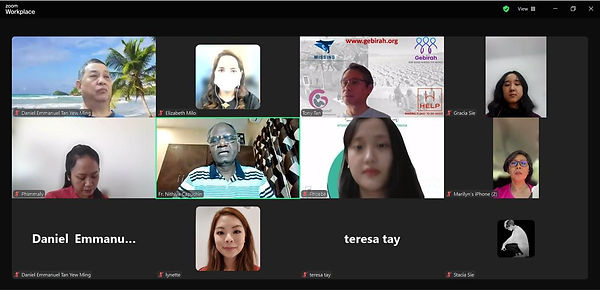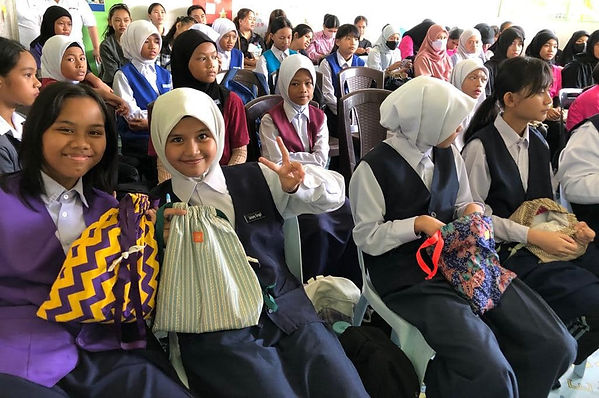Empowering Vulnerable and Marginalized Women through Menstrual Hygiene Education and Sustainable Sanitary Pad Production
Project Title:
Menstrual Hygiene Education and Sustainable Sanitary Pad Production
Progress Report : 21 Dec 24
Dear Friends and Supporters,
We are excited to share updates on our Menstrual Hygiene Project, which aims to address period poverty, reduce stigma, and empower underserved communities. Here's what we've achieved so far:
1. First Team Meeting
We held our inaugural team meeting, bringing together volunteers and key stakeholders. This session provided an opportunity for introductions, a deep dive into our project goals, and the assignment of specific roles and tasks to ensure efficient collaboration moving forward.
2. Our Growing Team
We are thrilled to share that our team now includes 21 dedicated volunteers, including 4 men, with ages ranging from their 20s to 60s. This diverse group brings a wealth of experience and enthusiasm to the project, reflecting our inclusive approach to tackling this important issue.
3. Theory of Change
The team has developed initial drafts of the Theory of Change for this project, outlining how we aim to create impact in underserved communities. These drafts are currently under review and will be finalized collaboratively in upcoming discussions.
4. Functional Leads and Organization
To streamline our efforts, we have assigned functional leads to oversee different areas of the project. This structure ensures clear accountability and maximizes the strengths of our team members.
5. Menstrual Hygiene Education
The Catholic Nurses Guild is preparing presentation materials to support menstrual hygiene education workshops. These resources will help us effectively engage women and girls in underserved communities, fostering better understanding and practices around menstrual health.
6. Research and Development
Our R&D and Production team is actively exploring ways to improve the design and functionality of reusable menstrual products. Their focus is on creating sustainable and user-friendly solutions tailored to the needs of the communities we serve.
7. Communications and Branding
Our Communications and Public Relations team is hard at work developing the branding and website for this initiative. These efforts will help raise awareness about our mission and make it easier for people to learn about and support our work.
Get Involved
We are always looking for passionate individuals to join our efforts. Whether your expertise lies in education, production, research, or advocacy—or if you simply want to lend a helping hand—there’s a role for everyone.
For more details about our project and how to get involved, please visit www.gebirah.org/menstrual-hygiene.
If you have any questions or ideas, feel free to reach out to us. Together, we can make a meaningful impact in the lives of women and girls around the world.

Introduction:
In the Gospel of Mark 5:25-34, we encounter a woman who had suffered from bleeding for twelve years. In her faith, she reached out to touch the edge of Jesus' cloak, believing even that simple act could bring healing—and it did. Jesus acknowledged her courage and said, "Daughter, your faith has healed you. Go in peace and be freed from your suffering."
This story resonates deeply with our mission. Just as this woman found healing and restoration, our project seeks to bring dignity and empowerment to women and girls facing the often-silent challenge of menstruation in marginalized communities.
Menstrual health is a critical yet often overlooked issue. Many women and girls lack access to proper education and affordable sanitary products, leading to health risks, stigma, and missed opportunities in education and employment. Our project addresses these challenges by providing menstrual health education and producing sustainable sanitary pads made from recycled fabric with the help of volunteers.
Through this initiative, we aim to not only meet practical needs but also restore a sense of dignity and empowerment to every woman and girl we serve. By promoting education and sustainability, we’re creating lasting change—one that uplifts women, preserves the environment, and strengthens communities.
Just as a small act of faith brought profound healing to one woman, this project aims to make a significant difference in the lives of many, ensuring they have the tools and knowledge to thrive with confidence and dignity.
Key Objectives
1. Education:
To educate girls and women about menstrual health, personal hygiene, and sustainable menstrual products.
2. Production:
To produce and distribute eco-friendly sanitary pads made from recycled fabric to underserved communities.
3. Stigma Reduction:
To reduce the stigma associated with menstruation through awareness campaigns, open discussions, and community engagement.
4. Sustainability:
To promote sustainable menstrual practices by encouraging the use of reusable pads and educating on proper disposal methods.
5. Community Empowerment:
To create a support network for women and girls, encouraging peer-to-peer education and emotional support.
Program Overview
1. Educational Workshops
Our educational workshops will cover topics such as menstrual health, nutrition during menstruation, coping with menstrual stigma, and emotional well-being. These workshops will be delivered both in person and online, allowing for flexibility in participation.
-
Sessions:
-
Understanding the menstrual cycle and recognizing abnormalities.
-
Proper use and disposal of menstrual products.
-
Pain management, dietary support, and physical activity during menstruation.
-
Hygiene practices to prevent infections and support overall health.
-
Target Audience:
Girls and women in underserved communities, including refugee populations and rural areas.
2. Sustainable Sanitary Pad Production
We will establish a production unit to manufacture sanitary pads made from recycled fabric. Volunteers will be trained to assist in the production process, creating a low-cost, environmentally friendly alternative to disposable pads.
-
Sourcing:
Materials will be sourced from donors, local recycling centers and textile factories to minimize waste and encourage a circular economy.
3. Distribution and Community Engagement
The sanitary pads will be distributed through community centers, schools, and healthcare facilities. We will also partner with NGOs, local leaders, and influencers to ensure that the products reach the most vulnerable populations.
-
Awareness Campaigns:
Community campaigns will focus on breaking down menstrual stigma and promoting open discussions about menstrual health.
Expected Impact
By providing menstrual hygiene education and sustainable sanitary products, we aim to:
-
Improve knowledge and self-confidence among women and girls in managing their menstrual health.
-
Reduce menstrual-related health complications, such as infections caused by poor hygiene.
-
Decrease environmental impact through the adoption of reusable sanitary products.
-
Foster supportive community networks that encourage ongoing education and open dialogue about menstruation.
-
Reduce menstrual stigma, leading to a more accepting and informed society.
Volunteer Opportunities: Key Roles and Responsibilities
To drive the success of this project, we have identified the following key roles:
1. Project Manager
Role Summary:
The Project Manager will oversee all aspects of the project, ensuring that the project runs smoothly and meets its objectives.
Key Responsibilities:
-
Manage daily operations, including education, production, and distribution.
-
Coordinate partnerships with schools, NGOs, healthcare providers, and material suppliers.
-
Monitor the impact of the program and report outcomes.
-
Oversee fundraising and financial sustainability.
Required Skills:
-
Strong leadership and project management experience.
-
Excellent communication, organization, and negotiation skills.
-
Familiarity with community development projects.
2. Production Coordinator
Role Summary:
The Production Coordinator will manage the production unit, ensuring that sanitary pads are made from high-quality recycled fabric and meet the needs of the community.
Key Responsibilities:
-
Set up and maintain the production process.
-
Source recycled materials and manage supplier relationships.
-
Train volunteers in the production of sanitary pads.
-
Ensure product quality and monitor inventory.
Required Skills:
-
Experience in production management, especially with textiles or sustainable products.
-
Organizational and logistical skills.
-
Ability to train and manage a team of volunteers.
3. Pad Production Volunteers
Role Summary:
Assist in the production of sanitary pads using recycled fabric.
Required Skills:
Basic sewing or textile skills (training will be provided), attention to detail.
4. Education & Outreach Lead
Role Summary:
The Education & Outreach Lead will develop and deliver menstrual health education programs and manage outreach efforts to reach underserved communities.
Key Responsibilities:
-
Design workshops and educational materials on menstrual health.
-
Deliver training sessions in schools and community centers.
-
Recruit and train volunteers to assist with educational efforts.
-
Build relationships with local leaders and healthcare professionals.
Required Skills:
-
Experience in public health or education, with a focus on women’s health.
-
Strong public speaking and curriculum development skills.
-
Ability to engage with diverse communities and deliver health information effectively.
5. Health Educators
Role Summary:
Volunteers trained to deliver menstrual health workshops and raise awareness about hygiene practices.
Required Skills:
Good communication skills, passion for health education.
6. Volunteer Coordinator
Role Summary:
The Volunteer Coordinator will recruit, train, and manage volunteers for both the production and education aspects of the program.
Key Responsibilities:
-
Recruit volunteers from the community.
-
Organize volunteer training sessions.
-
Manage volunteer schedules and ensure engagement.
-
Act as the point of contact for volunteers and ensure they are well-supported.
Required Skills:
-
Excellent interpersonal and communication skills.
-
Experience in volunteer management.
-
Organizational skills and the ability to motivate and engage volunteers.
7. Marketing & Communications Manager
Role Summary:
The Marketing & Communications Manager will promote the project, its products, and its mission through various media channels.
Key Responsibilities:
-
Develop and implement marketing strategies to raise awareness.
-
Manage social media accounts, websites, and promotional materials.
-
Organize fundraising events and online campaigns.
Required Skills:
-
Experience in marketing and communications, particularly for nonprofits.
-
Strong social media management and content creation skills.
-
Knowledge of fundraising and donor engagement strategies.
8. Community Advocates
Role Summary:
Help promote the program within communities, reduce menstrual stigma, and organize outreach events.
Required Skills:
Public speaking, community engagement.
9. Marketing & Social Media Volunteers
Role Summary:
Promote the initiative on social media and assist with content creation.
Required Skills:
Social media management, digital marketing.
10. Fundraising Volunteers
Role Summary:
Support fundraising events and campaigns to help sustain the program.
Required Skills: :
Event planning, donor relations.
Conclusion
By combining menstrual health education, sustainable sanitary pad production, and community engagement, this will help girls and women take control of their health while promoting environmental sustainability. With the support of volunteers and partners, we aim to create lasting change in the way menstruation is understood, discussed, and managed in underserved communities.









_png202409270331241632.png)